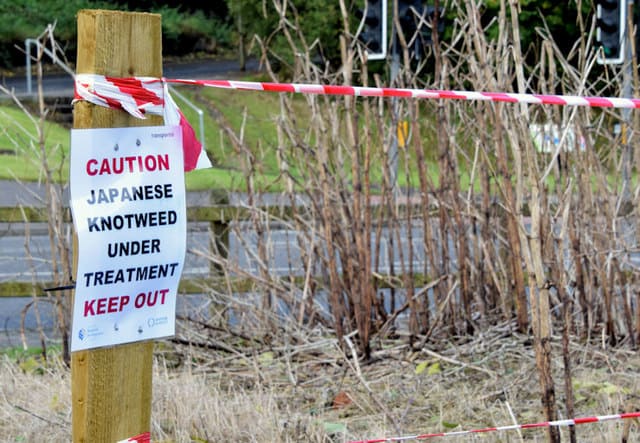Ornate and prized as something grand,
We didn’t know what you had planned;
The warning signs we did not heed,
You suffocate us with your need.
With tendrils that spread far and wide,
Ensnaring that which once had thrived;
Malevolence in every seed,
You suffocate us with your need.
Your selfish aim now realised:
Diversity – monopolised;
With malformed roots that choke at speed,
You suffocate us with your need.
Beneath the forest canopy,
There is no more an emerald sea;
Just endless shells of knotted weed,
You suffocate us with your need.
Whilst ivy of the poisoned kind,
To human touch is most unkind;
Its presence counteracts your greed,
You suffocate us with your need.
Unless we tear you from the Earth,
New life will not be given birth;
The soil is screaming to be freed,
You suffocate us with your need.

This is a Kyrielle, inspired by recent research that has discovered how poison-ivy can help to prevent the severe damage to forests that is caused by the invasive Japanese knotweed.
Japanese knotweed is a large perennial plant that is native to East Asia, but which was introduced to many other countries in the early 1800s, initially as an ornamental plant. However, the plant has since become the bane of gardeners the world over, as the rapid annual growth of the plant, along with its relentless spread, allows it to easily overwhelm other plants. By examining forests along the Susquehanna River, in Pennsylvania, researchers in this study found that Japanese knotweed was responsible for preventing the growth of new plant species in the forest, but that it also prevented trees that were already established in the canopy from growing and reproducing in that region. Below the canopy of these forests there is now almost nothing apart from an eight-to-twelve-foot-tall thicket of knotweed growing from the forest floor.
However, the researchers also found that Japanese knotweed was unable to completely dominate areas in which poison ivy is also present. Whilst poison ivy is much maligned by humans for causing an irritating, and sometimes painful rash, it is far less destructive than Japanese knotweed, as it does not prevent the co-habitation of other native plants, and can even create microhabitats which help tree seedlings to get established. However, the researchers concluded that poison ivy cannot be relied upon to fully combat the effects of Japanese knotweed, and that instead it is necessary to manually eradicate the weed from these regions. If this is not done then these forests will eventually change from tree-dominated riverbank habitats into knotweed-dominated shrublands, which are incapable of supporting a rich biodiversity of insects, birds, and other wildlife. Furthermore, the loss of trees in these habitats could lead to riverbank erosion, thereby increasing the risk of dangerous flooding in the region.
An audio version of this poem can be heard here.
Discover more from The Poetry of Science
Subscribe to get the latest posts sent to your email.
amazing Sam, I really like this!
have a nice eeekend,
Rolf
Thank you Rolf! 🙂
And you too,
Sam